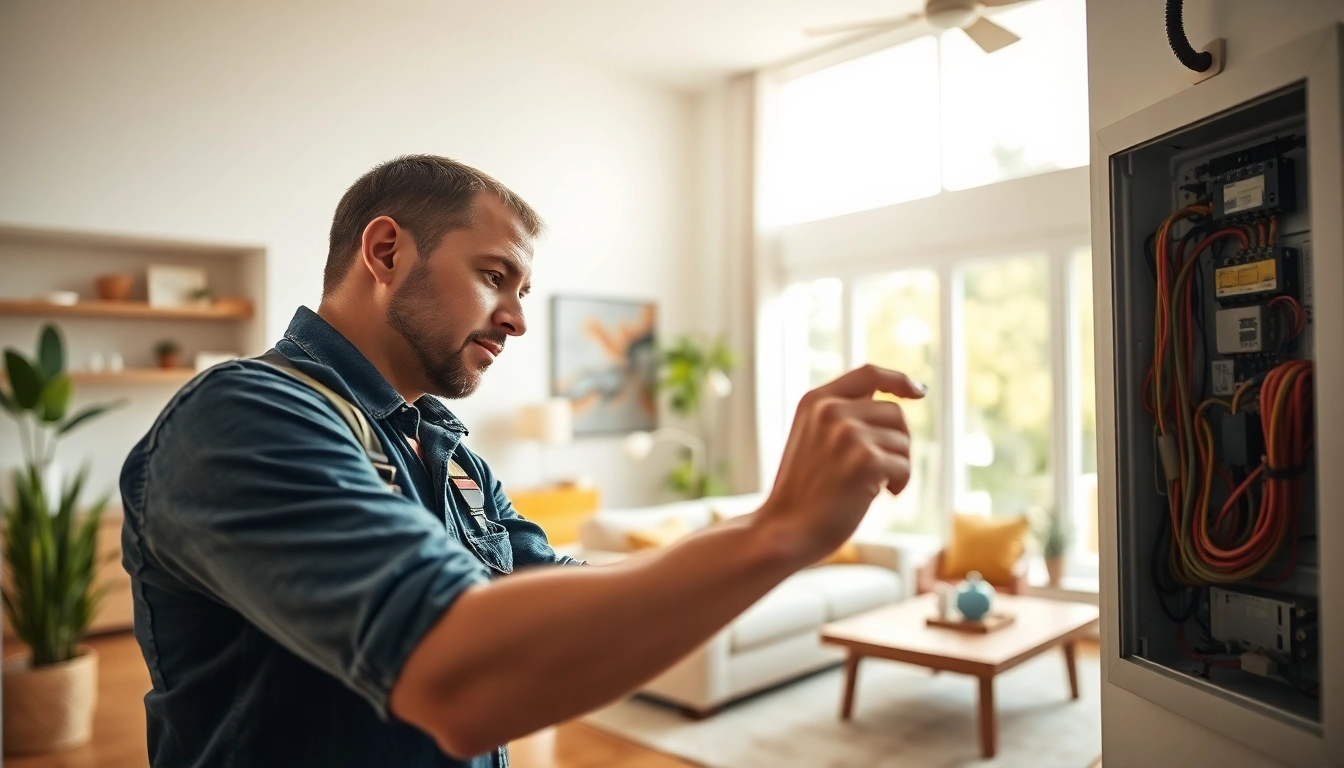Understanding Electrical Service Basics
Electrical service is foundational to both residential and commercial properties, facilitating the flow of energy necessary for lighting, heating, and operating essential appliances. It encompasses a wide range of activities, from installation and maintenance to upgrades and repairs. Understanding the basics of electrical service is crucial for ensuring safety, efficiency, and compliance with local regulations. For a comprehensive overview of this topic, you can explore the Electrical Service options available.
What Constitutes Electrical Service?
Electrical service refers to the framework of electrical systems that supply power to a building. This encompasses the following key components:
- Main Electrical Panel: The hub where all electrical circuits connect, often equipped with circuit breakers or fuses.
- Wiring: Networks of insulated conductors that deliver electricity to various parts of the property.
- Outlets and Switches: Interfaces for connecting and controlling electrical devices.
- Lighting Fixtures: Components that illuminate interior and exterior spaces.
In addition to these components, electrical service can include energy efficiency audits, solar energy solutions, and the integration of smart home technologies.
Key Electrical Service Offerings
Electrical service encompasses a variety of offerings, including:
- Installation Services: This involves setting up new electrical systems, wiring, and lighting fixtures in new constructions or renovations.
- Repair Services: Addressing issues like malfunctioning outlets, faulty wiring, breaker replacement, and system malfunctions.
- Maintenance Services: Regular inspections and servicing of electrical systems to prevent failures and enhance safety.
- Upgrades: Enhancing existing systems to accommodate new technology or increased power demands.
- Emergency Services: Immediate response for midnight outages or urgent repairs, ensuring safety and functionality.
Importance of Professional Electrical Service
Professional electrical service is paramount for several reasons:
- Safety: Electrical work is complex and poses significant risks. Certified electricians adhere to safety standards that protect property and lives.
- Compliance: Professional services ensure compliance with local and national electrical codes, preventing legal issues and safety hazards.
- Efficiency: Skilled electricians can identify and fix problems, optimizing the efficiency of electrical systems and potentially reducing energy costs.
- Reliability: Quality service ensures durability and reliability of electrical systems, reducing the likelihood of future problems.
Common Challenges in Electrical Service
Despite the benefits of professional electrical service, challenges often arise that can complicate solutions.
Identifying Electrical Issues
Electrical issues can manifest in various ways, ranging from flickering lights to sudden outages. Common signs include:
- Frequent circuit breaker trips.
- Flickering or dimming lights.
- Burning smells or discoloration around outlets.
- Inconsistent power supply.
Identifying the root cause of these issues often requires skilled assessment and testing by an electrician, as DIY attempts can lead to further complications.
Dealing with Electrical Outages
Electrical outages can occur unexpectedly due to various causes, such as storms, equipment failure, or overloaded circuits. A systematic approach to managing outages includes:
- Emergency Preparedness: Keeping a supply of essential items like flashlights and backup batteries.
- Communication: Keeping contact information for local utilities and understanding their procedures for reporting outages.
- Generator Installation: In some cases, investing in a backup generator can keep critical systems powered during outages.
Understanding Electrical Codes
Electrical codes are established guidelines that ensure safe electrical installations and maintenance. These regulations vary by region but typically include:
- Wiring methods.
- Grounding and bonding requirements.
- Installation standards for outlets and fixtures.
- Load calculations for circuits.
Understanding and adhering to these codes not only enhances safety but is also essential for passing inspections, particularly in new constructions or significant renovations.
Selecting the Right Electrical Service Provider
Choosing a reliable electrical service provider is critical in ensuring quality work and safety.
Researching Qualifications and Licenses
When selecting an electrical service provider, verify their credentials:
- Licensing: Confirm that the electrician is properly licensed in your state, as this indicates they have met necessary training and competency standards.
- Insurance: Ensure the provider carries liability insurance and worker’s compensation to protect both you and their team during service.
- Certifications: Look for additional certifications that indicate specialized skills, such as in energy efficiency or smart home technologies.
Evaluating Customer Reviews
Customer feedback is a valuable tool in evaluating potential providers:
- Online Reviews: Check platforms like Google, Yelp, or Angie’s List for customer experiences.
- References: Ask the provider for references from past clients to gain insight into their reliability and quality of work.
- Rating Aggregates: Look for patterns in reviews, such as consistent praises or complaints regarding the same service aspects.
Comparing Service Pricing and Packages
Pricing transparency is crucial when selecting electrical services. Consider the following:
- Quotes: Obtain detailed quotes from multiple providers to compare prices and services offered.
- Service Packages: Some providers may offer bundled services at a reduced rate, particularly for maintenance plans.
- Warranty and Guarantees: Evaluate if the provider offers warranties on workmanship or parts, adding extra value and peace of mind.
Enhancing Electrical Safety in Your Home
Creating a safe electrical environment is essential for any property owner. Here are strategies to bolster electrical safety in your home:
Regular Maintenance Practices
Routine maintenance of electrical systems can prevent failures and ensure longevity. Key practices include:
- Annual Inspections: Scheduling yearly check-ups with a qualified electrician to assess your electrical system and address any emerging issues.
- Testing Smoke Detectors: Ensuring smoke detectors are functional and their batteries are replaced regularly.
- GFCI Testing: Regular testing of Ground Fault Circuit Interrupter (GFCI) outlets, especially in areas prone to moisture like kitchens and bathrooms.
Upgrading Your Electrical Systems
As technology advances, so too should your electrical systems:
- Panel Upgrades: Older panels may not handle modern electrical loads efficiently; upgrading can enhance performance and safety.
- Wiring Replacements: Replace outdated wiring systems with modern, safer alternatives, particularly in older homes.
- Energy-Efficient Lighting: Installing LEDs and smart lighting solutions can lower energy consumption and enhance safety through better visibility.
Installing Safety Devices
Equip your home with devices that enhance electrical safety:
- Surge Protectors: Protect sensitive electronics from voltage spikes.
- Arc-Fault Circuit Interrupters (AFCIs): These devices detect irregularities in electrical current to prevent electrical fires.
- Smart Home Technologies: Integrating smart systems allows for remote control and monitoring of your home’s electrical usage and safety.
Future Trends in Electrical Service
The electrical service industry is evolving rapidly, and staying informed about emerging trends can help you maximize efficiency and safety.
Smart Home Technology Integration
Smart home technologies are revolutionizing the electrical landscape:
- Home Automation: Systems like smart thermostats and lighting allow homeowners to control their environment from smartphones or voice-activated devices.
- Energy Management Systems: These systems provide real-time data on energy consumption, helping users optimize usage and reduce costs.
- Connected Appliances: Many modern appliances can now communicate with home networks for enhanced functionality and efficiency.
Renewable Energy Solutions
The shift towards renewable energy is gaining strong traction:
- Solar Power: Solar panels can be integrated into residential electrical systems, offering potential savings and sustainability.
- Battery Storage: Emerging technologies in energy storage systems enable households to store excess energy for later use.
- Energy Audits: Adopting green practices through energy audits can help identify potential areas for improvement in energy consumption.
Advancements in Electrical Service Tools
Innovation is commonplace within the electrical service sector:
- Smart Tools: Wireless diagnostic tools enhance the efficiency of electricians in problem-solving tasks.
- Augmented Reality: AR is being utilized for planning and visualization of complex electrical layouts.
- Data Analytics: Data-driven approaches are being adopted for better energy management and predictive maintenance.



